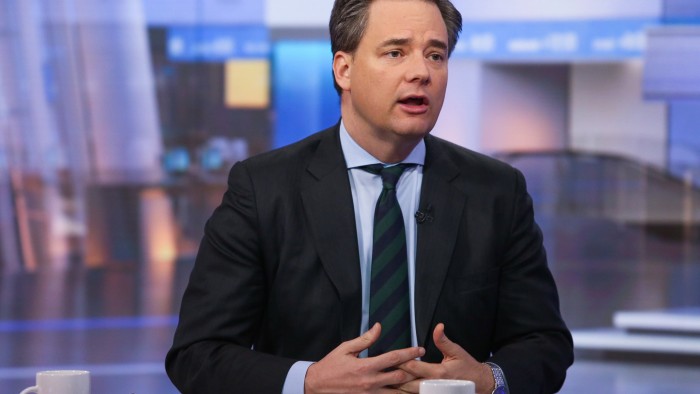Unlock the Editor’s Digest for free
Roula Khalaf, Editor of the FT, selects her favourite stories in this weekly newsletter.
Top BlackRock executive Mark Wiedman is departing, in a move that disrupts the asset manager’s planning for the eventual departure of founder Larry Fink, according to four people close to the company.
Wiedman had been widely discussed as a potential successor to Fink for more than a decade and had recently been one of the $11.5tn asset manager’s most prominent public faces as the head of its client business.
BlackRock’s board described him in as a regulatory filing last year as one of three “senior leaders who we believe will play critical roles in BlackRock’s future” as it granted him a special retention package.
However, Wiedman, who led the integration and rapid growth of BlackRock’s flagship index and exchange traded fund business, has opted not to wait around. His departure is expected to be announced very shortly, the people said. He is forfeiting $8mn in stock options, according to the proxy.
Wiedman’s departure comes after the world’s largest asset manager embarked on a $28bn acquisition spree last year to bulk up its footprint in the fast-growing and lucrative alternative assets sector. The strategic moves not only put pressure on Fink, 72, to personally oversee their success, but also brought in a clutch of high-powered and high-paid executives who need to be carefully managed.
Fink, who has led BlackRock since its 1988 founding, is very popular with investors and is among the most influential figures in finance. But analysts and some within the firm have begun expressing concerns whether the slow pace of succession planning will drive the next generation of top talent to start going elsewhere. BlackRock president Rob Kapito, 67, is also a founder of the firm.
BlackRock declined to comment.
Wiedman is leaving almost exactly a year after Salim Ramji, another executive who was also once touted as a potential leader. Ramji became chief executive of Vanguard, BlackRock’s chief rival in the US and the world’s second-largest asset manager. Several other lower-ranking executives have also left in the past few years to take leadership jobs at smaller firms, including Daniel Gamba to Northern Trust and Zach Buchwald to Russell Investments.
After Ramji left, the group touted its strong stable of current leaders, including Wiedman and two other executives who also received special option grants: chief operating officer Robert Goldstein and chief financial officer Martin Small.
“BlackRock is proud to have a record of our firm’s alumni going on to lead multiple investment management companies and financial institutions,” it has previously said.
A senior Wall Street figure with knowledge of the situation said “Larry [Fink] and Rob [Kapito] are not going anywhere. They just made a major acquisition and you have to see that through, [but] Wiedman is at an age where if he doesn’t make a move, he ages out of being a CEO.”
A lawyer by training, Wiedman joined BlackRock in 2004 after stints at the US Treasury and McKinsey. He started BlackRock’s financial markets advisory consulting arm, which helped central banks and government agencies dig through the rubble of the 2008 financial crisis.
Wiedman negotiated the 2009 purchase and integration of Barclays Global Investors, the deal widely seen as the most important in BlackRock’s history. He then headed up the resulting iShares business from 2011 to 2019 as it developed into a juggernaut in index and ETFs.
Keenly interested in talent development, Wiedman recruited or promoted many of BlackRock’s top executives, including Small and Rachel Lord, who heads the international business.
Read the full article here




